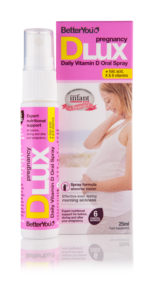
Sponsored post
Five things you need to know about Vitamin D for you and for your little one
Health pioneers BetterYou and Dr Benjamin Jacobs, Consultant Paediatrician at the Royal National Orthopaedic Hospital talk about five things new mums need to know about Vitamin D.
1. How do you get Vitamin D?
Sunshine and diet are the most common ways to get enough Vitamin D. However, just 10 per cent of Vitamin D is available through your diet. Ninety per cent of our essential Vitamin D must come from our skin’s exposure to the sun but skin cancer fears have led to sun screen overuse. With creams higher than factor 15 blocking Vitamin D absorption, Vitamin D deficiency is believed to be soaring to epidemic proportions. In addition, our increasingly sedentary, indoor lifestyles mean we have to look to other ways to obtain Vitamin D, such as supplementation.
2. Who should take Vitamin D?
Dr Benjamin Jacobs says: “Vitamin D is especially important for mums-to-be and new mums. During pregnancy, or when breastfeeding, mothers need extra Vitamin D to maintain their own bone health, as well as providing nutrients to their baby.”
Low Vitamin D levels can have a major impact on expectant mothers and their foetus. Importantly, research now shows that pregnant women with low levels of Vitamin D may have higher rates of pregnancy-related health conditions, including pre eclampsia, gestational diabetes, birth by Caesarean section and a lowering of the immune system.
Public Health England recommends that all pregnant and breastfeeding women use a Vitamin D supplement all year round.
Do you think you might be vitamin D deficient? Read the signs and symptoms here
Read more about the importance of vitamin D for children
3. Know your levels
You can test your Vitamin D levels using an affordable and accurate NHS home testing kit, which uses a simple and painless finger-prick test. Testing is carried out using liquid chromatography mass spectrometry to measure the Vitamin D in the blood. A clear interpretation of the Vitamin D level is then sent to the customer around five days later.
This is available on the BetterYou website.
4. How much is enough?
Dr Benjamin Jacobs says: “Recently, the Maternal Vitamin D Osteoporosis Study of more than a thousand pregnant women showed strong evidence that we can improve the health of babies’ bones by giving mothers a daily dose of 1000 units of Vitamin D.
“This is one of the most important pieces of scientific research ever performed in this field. Until now, authorities in the UK only recommended 400 units of Vitamin D daily in pregnancy but this study showed that 1000 units is safe and probably more beneficial.”
 5. Supplementing is just a spray away…
5. Supplementing is just a spray away…
BetterYou’s award winning DLuxPregnancy daily Vitamin D oral spray guarantees optimal absorption of essential vitamins, delivering an optimal 1,000 IU (25mcg) of Vitamin D3 along with the recommended 400mcg of Folic Acid, 6mcg of Vitamin B12 and 100% of the guideline daily amount of Vitamins K, B1 and B6. An oral spray does not require water to take, does not need to be taken with food and is easy to use on the go. It’s also a great option for women experiencing morning sickness or those who have problems swallowing pills.
BetterYou supports National Vitamin D Awareness Week which runs from 24-30 October 2016
www.vitamindawarenessweek.co.uk
#VitDaware
FOR INFO Supporting links:
http://www.mirror.co.uk/news/technology-science/science/taking-vitamin-d-youre-pregnant-7473126
http://www.medscape.com/viewarticle/859078
http://news.yahoo.com/children-breastfeeding-first-birthday-vitamin-d-214535174.html

 5. Supplementing is just a spray away…
5. Supplementing is just a spray away…